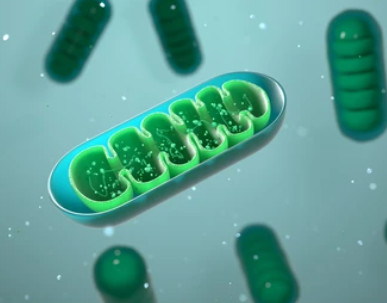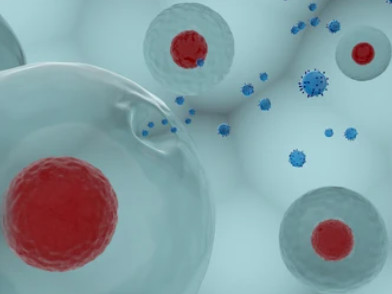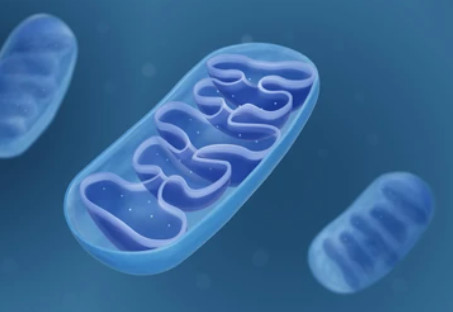Exosomes in Cellular Communication and Disease Treatment
Online InquiryIn recent years, exosomes have received much attention as versatile mediators of cellular communication. These small membrane-bound vesicles are secreted by a wide range of cell types and transport proteins, nucleic acids and lipids. Their role in transmitting biological information between cells has elucidated a new dimension of cellular crosstalk. Exosomes have emerged as key players in intercellular communication and disease treatment, revolutionizing our understanding of intercellular signaling and providing promising avenues for innovative therapeutic strategies.
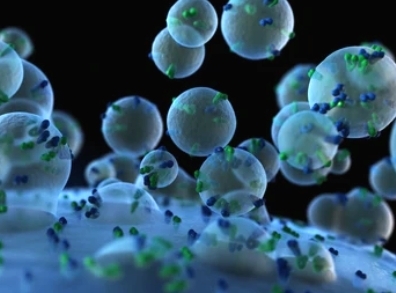
The Role of Exosomes in Cellular Communication
At the crossroads of cell-to-cell communication lies a remarkable class of messengers: exosomes. These diminutive, lipid-bilayered vesicles, secreted by various cell types, have emerged as pivotal mediators of intercellular dialogue. Their ability to shuttle a diverse cargo of molecules between cells, regardless of proximity, has unveiled a complex network of molecular crosstalk that governs both physiological homeostasis and pathological progression.
Exosomes owe their significance to their multifaceted cargo composition. Packed within these nanoscale packages are a myriad of bioactive molecules, including proteins, nucleic acids, lipids, and metabolites. It is this diverse payload that bestows upon exosomes the power to deliver intricate messages across cellular landscapes.
- Proteins. Exosomes encapsulate an array of proteins, from signaling molecules to membrane receptors. This assortment of proteins equips exosomes with the ability to transmit a spectrum of information, ranging from simple signals to intricate instructions, thereby regulating processes such as cell proliferation, differentiation, and immune response modulation.
- Nucleic Acids. Within exosomes reside fragments of nucleic acids, including microRNAs, mRNAs, and even non-coding RNAs. These genetic messengers can be transferred intact to recipient cells, where they influence gene expression, protein synthesis, and epigenetic regulation. Such transfer of genetic material adds a layer of complexity to exosome-mediated communication, enabling cells to synchronize their activities across distances.
- Lipids and Metabolites. Exosomes also harbor lipids and metabolites, which can profoundly impact cellular metabolism and signaling pathways. These molecules can act as secondary messengers, orchestrating intricate responses within recipient cells. By delivering lipids and metabolites, exosomes contribute to the modulation of cellular functions such as energy metabolism and membrane composition.
The journey of exosomes begins with their biogenesis within the endosomal compartment. As early endosomes mature into multivesicular bodies (MVBs), intraluminal vesicles containing selected biomolecules are formed. These MVBs can either fuse with lysosomes for degradation or be released into the extracellular space as exosomes, thus facilitating the dissemination of their cargo.
Exosome release is not a random event, instead, it is tightly regulated by cellular cues and stimuli. Various factors, including cellular stress, inflammation, and developmental signals, influence exosome secretion. Once released, exosomes can travel through bodily fluids, bridging cellular gaps and facilitating communication between cells that may be distant or inaccessible through conventional means.
From orchestrating immune responses to influencing stem cell behavior, exosomes are pivotal players in cellular communication networks. These tiny vesicles transcend the confines of individual cells, sculpting the landscape of intercellular crosstalk and unraveling novel dimensions of cell biology. As our understanding of exosome biology deepens, Creative Proteomics remains at the forefront of harnessing their potential, propelling scientific discovery and therapeutic innovation into uncharted territories.
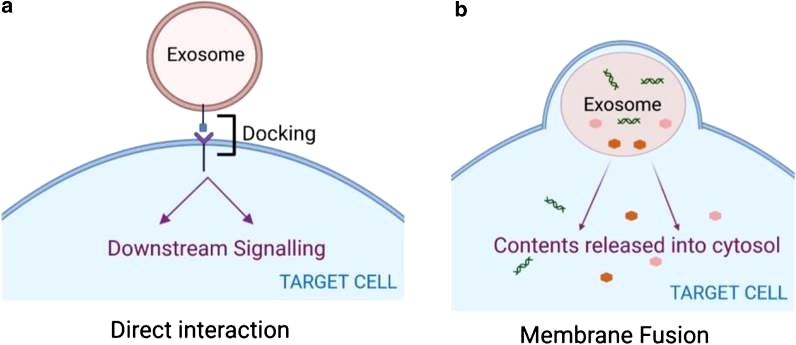 Exosome signalling by direct interaction or membrane fusion (Gurung S, et al,. 2021)
Exosome signalling by direct interaction or membrane fusion (Gurung S, et al,. 2021)
Learn more
Exosomes in Lipidomics: Understanding the Role of Cell Membrane Lipids in Signal Transduction
The Role of Exosomes in the Treatment of Disease
The unique properties of exosomes have led to their exploration as promising therapeutic tools. Creative Proteomics, a pioneering company at the forefront of biotechnology, has harnessed exosomes for innovative disease treatment strategies.
- Cancer Therapy. Exosomes hold immense potential in cancer therapy. They can be engineered to carry therapeutic cargoes, such as siRNAs targeting oncogenes or chemotherapeutic agents, directly to tumor cells. These engineered exosomes can bypass biological barriers and enhance drug delivery efficiency while minimizing off-target effects. Biomart's cutting-edge research has demonstrated the successful utilization of exosomes as targeted drug delivery systems in preclinical models.
- Neurodegenerative Diseases. The blood-brain barrier presents a formidable challenge for delivering therapeutic molecules to the brain. Exosomes, with their ability to traverse this barrier, offer a unique avenue for treating neurodegenerative diseases. Exosome-based formulations created exclusively by Creative Proteomics have demonstrated potential in delivering neuroprotective compounds to neurons, creating new therapeutic avenues for conditions including Alzheimer's and Parkinson's disease.
- Regenerative medical practice. Exosomes are essential for tissue repair and wound healing. Exosomes are used in Creative Proteomics' novel strategy to support tissue regeneration and repair. The inflammatory response, angiogenesis, and cell proliferation at the site of injury can all be modulated by these bioactive vesicles, hastening the healing process.
Learn more
Exosome Proteomics in Disease Research
Exosome Proteomics in Disease Mechanisms Analysis
The Association and Mechanisms of Exosomes and Metabolic Diseases
Exosomes have become useful tools for treating diseases and cellular communication. As a preeminent authority on exosomes, Creative Proteomics has seen firsthand the revolutionary potential of exosome-based therapeutics. Exosomes are changing the appearance of modern medicine by creating customized drug delivery systems and modifying immune responses. Creative Proteomics is dedicated to developing ground-breaking solutions that harness the potential of exosomes for the improvement of human health even as we work to understand their intricate workings.
Reference
- Gurung S, Perocheau D, Touramanidou L, Baruteau J. The exosome journey: from biogenesis to uptake and intracellular signalling. Cell Commun Signal. 2021;19(1):47.
Related Services
* For Research Use Only. Not for use in diagnostic procedures.



